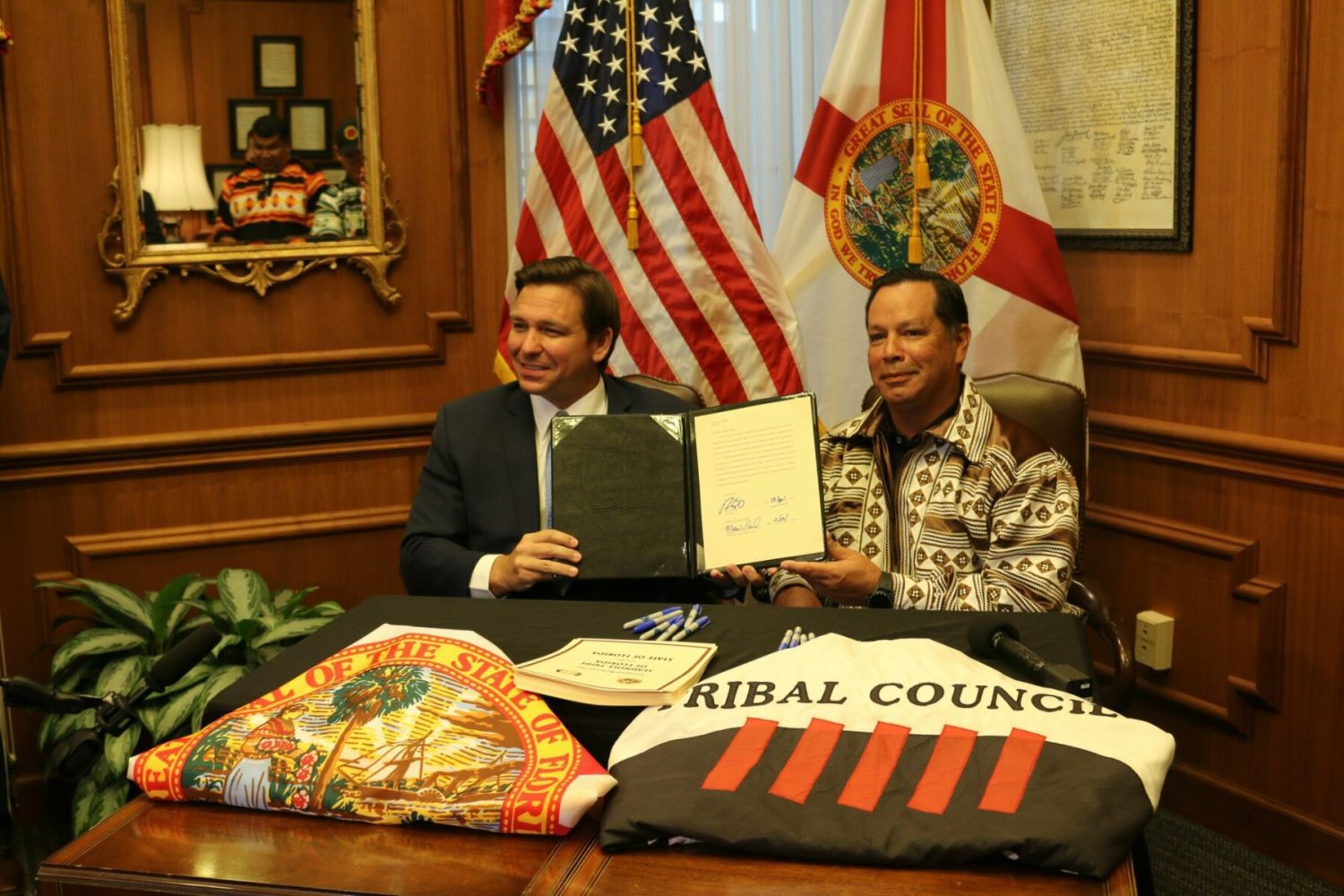Florida’s new gaming compact with the Seminole Indians was applauded by the tribe and state’s governor but left some legal experts and gaming analysts wondering if it would survive any expected challenges federally and in the courts.
Under the 30-year agreement signed with Gov. Ron DeSantis, the Seminoles can expand gaming inside their Florida casinos by adding craps and roulette and giving the tribe the oversight of legalized sports betting, including partnering with slot machine casinos, racetracks, and jai-alai frontons.
The tribe, through its Seminole Gaming subsidiary, operates six of the state’s seven tribal casino properties, including Hard Rock Tampa and Hard Rock Hollywood near Fort Lauderdale. The Seminoles own Hard Rock International.

Gov. Ron DeSantis and Seminole Tribe Chairman Marcellus Osceola Jr./Photo via the governor’s Twitter page
Deutsche Bank gaming analyst Carlo Santarelli said Friday the partnership with non-tribal gaming operators isn’t fully spelled out and it’s unclear how many sports betting skins each facility would receive.
“This development confirms our view that any legalization of sports betting will be done on terms of the Seminole tribe,” Santarelli said. “We believe there will be little to no opportunity for the public operators to play a role, given the Seminoles’ control.”
Florida is expected to receive at least $2.5 billion from the tribe over the first five years of the compact and at least $6 billion by 2030. DeSantis said the deal will create 2,200 new jobs.
In an interview with CDC Gaming in February, Seminole Gaming Chairman Jim Allen said the tribe had the ability to offer the state $500 million a year in revenue sharing. He said several “legitimate” independent studies on Florida sports betting show the activity would have a cash flow profit of between $200 million and $280 million a year.
“We feel the state may be interested in working with us to reinstitute our revenue share and if that is the mindset of the state, we’re happy to sit down and discuss it,” Allen said three months ago. “We’ve always had a good relationship (with Florida) in my 20 years.”
Florida joins the game
The agreement in Florida marks the tentative approval of sports betting by the largest state that currently doesn’t offer the activity. More than half of the U.S. – 27 states and Washington D.C. – have legalized sports betting in the last three years. Analysts and sports betting operators have been watching for possible maneuvers in Florida, as well as California and Texas.
The compact requires approval by Florida’s legislature at a special session starting May 17. The Seminole Tribal Council and the U.S. Department of the Interior, which oversees tribal gaming operations, also have to sign off on the deal.
Under the agreement, the state’s sports betting servers would be housed on tribal land and the Seminoles would control the activity. The non-tribal casino operators would be allowed to market and offer sports betting using their own software and individual brands.
Union Gaming Group analyst John DeCree said the tribe is “incentivized” to partner with at least three non-tribal facilities within the first three months of launching, otherwise, its compact payments to Florida would increase by 2%.
“Importantly, the compact prohibits the tribe from using player data obtained from a wager placed via a pari-mutuel partner,” DeCree said.
Legal challenges expected
The ink wasn’t even dry before opponents weighed in.
One Florida-based anti-gaming group believes the compact violates the 2018 voter-mandated Amendment 3, with requires Florida voters to approve any new gaming expansion in the state.
DeCree said the agreement is “not technically expanding gambling in the state” because it is only expanding the activity on the tribe’s reservations, which fall under state law.
One issue could be the provision in which the Seminoles will pay a 60% commission to third-party operators. The federal Indian Gaming Regulatory Act prohibits a tribe from sharing more than 40% of its net gaming revenue.
“We suspect between the supplier fee and its own independent market share, the tribe will have no problem paying its partners 60% commission while still maintaining 60% of overall sports win in the state,” DeCree said.
However, gaming attorney Daniel Wallach told WFLA news radio the sports betting agreement may not survive various legal challenges. Even if the Interior secretary off on the compact, Wallach said there would still be lawsuits.
“Placing a mobile server on tribal property and allowing off-reservation gaming at racetracks, in pari-mutuel facilities, ballparks and the like, that is an un-approvable gaming compact,” Wallach said. “Under federal case law you can challenge a U.S. Secretary of the Interior determination on a gaming compact as being contrary to law arbitrary and capricious, and it runs smack into a long line of cases that said compacts can’t include mobile wagering.”
DeCree said he expects the Florida legislature will ratify the agreement because the Seminole’s “significant gaming exclusivity in Florida” could have shut out commercial gaming operators.
“We believe the inclusion of multiple online skins as ‘management contractors’ with what is essentially a 40% tax rate is a significant win for the industry,” DeCree said. “We expect Florida to be a very large betting market with plenty of revenue to go around.”
Howard Stutz is the executive editor of CDC Gaming. He can be reached at hstutz@cdcgaming.com. Follow @howardstutz on Twitter.




